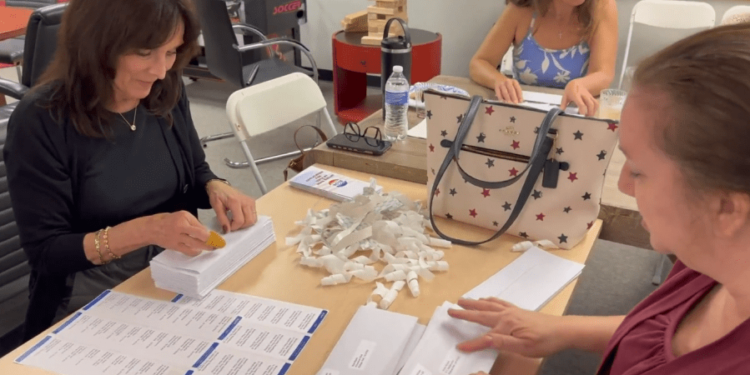
(NewsNation) — It’s the place where the first rock and roll song was ever performed, where the dance “The Twist” first originated, and it’s where Republican former president Donald Trump held a rally in May, declaring he was going to win the state in the 2024 presidential election.
The place is New Jersey, a state that hasn’t gone red since 1988, when the original “Beetlejuice” was haunting theaters.
Latest polls show Democratic nominee Vice President Kamala Harris having a comfortable lead over Trump.
Republicans here are hoping they can swing enough suburban voters who are fed up with high property taxes and what they call liberal social agendas so they can “Make New Jersey Red Again.”
“I’m hoping to turn the state red,” one of them, Kathleen Wioland, says.
In suburban Morris County, Republican volunteers had a pizza party, where they worked on luring in every vote.
“We have wine, we have high noons, we have beer,” Republican organizer Amanda Ackerman said. “I try to make my volunteer nights kind of a party.”
Across the country, both Democrats and Republicans are focused on winning the suburban vote, especially from women — a key voting block that propelled Biden to the White House in 2020 and could reshape Washington in 2024.
Still, this can be a challenging task.
“I think it’s increasingly difficult to, probably, put any constituency in a box,” Randy Adkins, a professor of political science at the University of Nebraska Omaha, said in an interview. “They often move because of the issue of the day.”
Political science experts say America’s picket fence neighborhoods are increasingly diverse and elastic, often flipping parties based on what’s currently fanning emotions.
“The issue of the day in 2016 is not the issue of the day in 2020, is not the issue of the day in 2024,” Adkins said.
Ackerman herself is a flipped Democrat, saying she’s tired of “self-censorship.”
“I realized that I was limiting my range of thought and limiting the things I was willing to even criticize or discuss because I didn’t want to offend anybody,” Ackerman said.
Christina Balestriere, a suburban mom with three boys, says she was a registered Democrat but plans to vote Republican this year because she’s upset over recent politics regarding gender identity in schools.
“They are starting these conversations at younger and younger ages without my input,” Balestriere said. “I think it’s a frightening path to lead a child down.”
Lauren Mills ran for her town council as a Democrat, but says she often votes for moderate Republicans.
“I’m pro-police, and I think that tends to be considered more Republican,” Mills said. “It should just be about America.”
As a mother of four, Mills sees character as a huge issue in this election.
“Behavior matters. The way you speak matters,” she said. “As soon as the president of the United States is calling people losers, being disrespectful, you’ve now allowed everyone else to do that. You’ve opened up these floodgates, and once those gates open up, nothing ever goes back to before.”
Jeanne Stifelman, with “Moms Demand Action,” says she switched from being a Republican in 2016.
“The fact that the Republican Party wants to get into the doctor’s offices with my young girls and determine what they should do with their bodies is unacceptable to me,” she said.
The issues are leaving America evenly split between Democratic nominee Harris and Republican Trump — and volunteers even more eager to make their voices heard.






